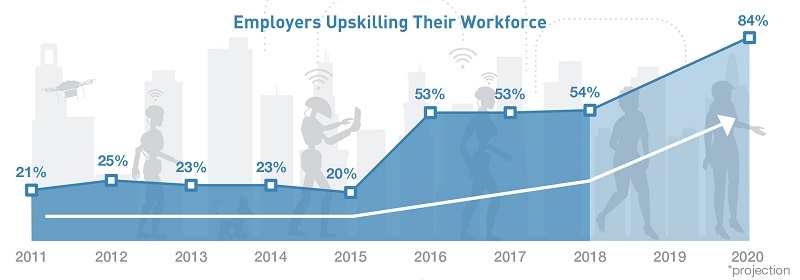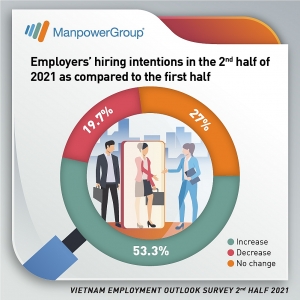Strengthening businesses’ immune system prior to economic reopening
 |
| Nguyen Thanh Huong, country human resources manager, ManpowerGroup Vietnam |
Hit by the four waves of COVID-19 infections with the latest outbreak raging all over the country, domestics businesses in various sectors have suffered severely in many ways. While some enterprises have been struggling to hold on, many others have already shut down or faced possible closure.
Thus, the recent signals from the government of reopening economic activities after a long time of social distancing and being on hold have sparked hope among businesses. Yet, the questions of how to reopen and to maintain healthy and safe operation are on the table, to which the cooperation between three parties – that is, the government, enterprises, and workers – is crucial.
There is more to it than meets the eye
In fact, businesses are having certain advantages when it comes to re-starting the economy. Firstly, after going through three waves of COVID-19 in the past, local enterprises have been better equipped with knowledge and experiences of dealing with the pandemic, as well as be ready for unanticipated situations. Both businesses and workers now know how to protect themselves. Secondly, despite the unpredictable developments of the coronavirus, businesses have come to play a more proactive role by searching for ways to conquer challenges. Particularly, some even proposed bold strategies to the authorities to achieve the dual target of keeping their employees safe and maintaining effective operation. Finally, after long days of lockdown with weaker financial health and life quality in general, more and more workers are looking forward to returning to work.
On the other hand, there are lots of challenges facing businesses. First, the COVID-19 pandemic in Vietnam remains a complication with no signs of slowing down in the number of new infections reported daily. Moreover, the country's overall vaccination rate remains low. By the end of September 2021, there are about 22.5 million people getting the first dose of vaccine and only 7.9 million people have been fully vaccinated in the country. Whilst the percentage of the population with two vaccine doses in big cities are considered modest (for example 38.4 per cent in Ho Chi Minh City, 17.9 per cent in Hanoi), the figures in provinces filled with industrial zones are even worse, such as in Binh Duong (3.4 per cent) and Dong Nai (6.6 per cent). As a result, it would be risky to bring workers back to normal at this time.
In addition, though the “three on the spot” and “one route two destinations” strategies have been enrolled for a while and showed certain benefits to businesses, such practices are burdening employers with huge effort, time, and money, and are thus unlikely to be a good solution in the long run.
During an online meeting with the Department of Industry of the Ministry of Industry and Trade in August, associations and businesses in manufacturing shared about their difficulties while applying Directive 16 and proposed solutions to major problems. Particularly, businesses were expecting clear guidelines in which cases and which methods of transportation that employees are allowed to go home after work, as well as different scenarios for operation, such as working at 30-100 per cent capacity, depending on their level of safety regulations and pandemic status.
In general, the mission of maintaining healthy operations and keeping employees safe at the same time is challenging for most businesses at the moment. Therefore, proper preparation with all parties’ efforts is necessary to make the impossible possible.
Boosting immunity for both businesses and employers
Recently, authorities in some provinces have proposed new approaches to economic recovery, “Open the economy wherever is safe”. This is considered a suitable solution for a steady and safe economic reboot instead of putting all sectors and areas on hold. We totally agree with this approach and would suggest turning to the successful model of green zones in residential areas and green lines or green factories in manufacturing areas.
Another factor is how to attract and retain foreign investment flows which play an extremely critical role in healthy economic recovery, especially when many regional companies are suffering from the pandemic. In addition to favourable policies to boost investors’ confidence, businesses are expecting further government support relating to employees, including prioritising full vaccination to workers of essential sectors, such as manufacturing.
Singapore is the latest example of a country which is planning to open its economy after achieving a high percentage of full vaccination. Currently, about 81 per cent of its population are fully vaccinated, which gives the government confidence to loosen restrictions such as easing public gathering limits or opening borders.
Employers should continue strictly applying general guidelines to keep a safe working environment, such as the 5K rules, even with fully vaccinated workers. Furthermore, as COVID-19 has radically impacted and transformed the world of work as well as worsened the global skill scarcity, employers need to understand the urgent demands of up-skilling and re-skilling people at speed and at scale to work effectively in the new normal. According to the Skills Revolution 4.0 Research by ManpowerGroup, an estimated 84 per cent of employers is carrying out regular up-skilling programs among their employees by 2020, which is four times higher than that figure in 2011.
 |
The prolonged COVID-19 pandemic has wrecked the national health and economy, during which unprecedented restrictions and regulations were made. While the decision of full economic reopening is left open with many factors to be considered, it is important to strictly follow the safety guidelines and particularly improve the health and capabilities of businesses from inside.
 Future of manufacturing: Up- and re-skilling during a tech revolution Future of manufacturing: Up- and re-skilling during a tech revolution |
 Vietnam: Hiring intentions stay positive in second half Vietnam: Hiring intentions stay positive in second half |
 Talent shortage in second half of 2021 and the way out Talent shortage in second half of 2021 and the way out |
What the stars mean:
★ Poor ★ ★ Promising ★★★ Good ★★★★ Very good ★★★★★ Exceptional
Related Contents
Latest News
More News
- Green jobs needed as businesses embrace sustainability (April 06, 2023 | 11:24)
- HR leaders urged to handle work management in global uncertainty (October 20, 2022 | 17:07)
- Facing the biggest HR challenges in 2022 (October 10, 2022 | 12:14)
- Solving talent shortages amid fierce human capital landscape (August 26, 2022 | 16:18)
- Employers expect hiring to increase in H2 (August 13, 2022 | 21:30)
- Stakeholders seek sustainable strategies to retain workers (June 21, 2022 | 17:54)
- Accelerating trends and renewed urgency for labour (May 05, 2022 | 14:25)
- Latest HR trends in logistics revealed (April 28, 2022 | 14:38)
- Sustainable employment under digital transformation and the pandemic (October 29, 2021 | 15:04)
- Employment security and the future of skills for Vietnamese workers in digital transformation (October 26, 2021 | 17:20)

 Tag:
Tag:
























 Mobile Version
Mobile Version